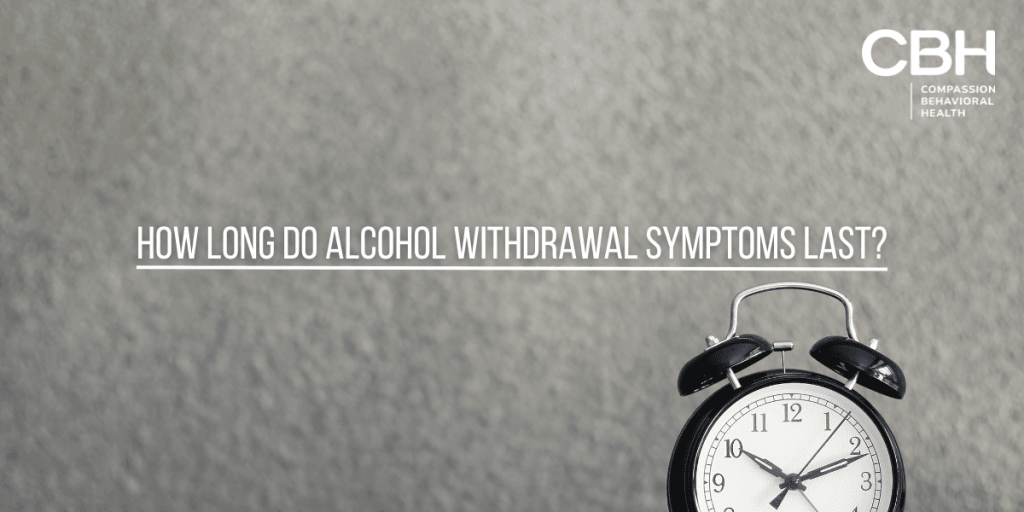Alcohol withdrawal can be a challenging and uncomfortable process for individuals who have developed an alcohol dependence. One of the most common questions people have is: How long do alcohol withdrawal symptoms last? The duration of alcohol withdrawal can vary depending on various factors, including the individual’s overall health, level of alcohol dependence, and lifestyle. In this article, we will explore the timeline of alcohol withdrawal symptoms, the factors influencing their duration, and how to effectively manage and support oneself during this process.
Understanding Alcohol Withdrawal
Before diving into the duration of alcohol withdrawal symptoms, it’s crucial to have a basic understanding of what alcohol withdrawal entails. Alcohol withdrawal is the set of physical and psychological symptoms that occur when someone suddenly stops or significantly reduces their alcohol intake after prolonged and heavy drinking.
Alcohol withdrawal can be a challenging and uncomfortable experience for individuals who have developed a dependence on alcohol. It is important to recognize that alcohol withdrawal is a serious medical condition that should be monitored and treated by healthcare professionals.
What is Alcohol Withdrawal?
Alcohol withdrawal occurs due to the adaptation of the brain and body to the presence of alcohol. When someone consumes alcohol regularly, their brain chemistry adjusts to accommodate the sedating effects of alcohol. Over time, the brain becomes reliant on alcohol to maintain a state of equilibrium. When alcohol intake is abruptly discontinued, the brain and body undergo a withdrawal process as they readjust to functioning without the presence of alcohol.
During alcohol withdrawal, individuals may experience a wide range of physical and psychological symptoms. These symptoms can vary in severity and duration depending on factors such as the amount and duration of alcohol consumption, individual physiology, and overall health.
Physical symptoms of alcohol withdrawal may include tremors, sweating, increased heart rate, nausea, vomiting, headache, and insomnia. Psychological symptoms can include anxiety, irritability, restlessness, depression, and difficulty concentrating.
The Science Behind Alcohol Withdrawal
Alcohol withdrawal is primarily driven by changes in the neurotransmitter system in the brain. Alcohol enhances the activity of gamma-aminobutyric acid (GABA), a neurotransmitter that reduces brain activity and produces a calming effect. With chronic alcohol use, the brain reduces its natural production of GABA and increases the release of excitatory neurotransmitters such as glutamate to counteract the sedating effects of alcohol. When alcohol intake is suddenly stopped, the brain becomes hyperactive, leading to a range of withdrawal symptoms.

Additionally, alcohol withdrawal can also disrupt the balance of other neurotransmitters in the brain, such as dopamine and serotonin, which play a crucial role in regulating mood and emotions. The dysregulation of these neurotransmitters during withdrawal can contribute to the psychological symptoms experienced by individuals.
It is important to note that alcohol withdrawal can be a potentially life-threatening condition in severe cases. Delirium tremens (DTs) is a severe form of alcohol withdrawal that can occur in individuals with a history of heavy and prolonged alcohol use. DTs is characterized by severe confusion, hallucinations, seizures, and cardiovascular instability. Immediate medical attention is required for individuals experiencing DTs.
Given the complexities of alcohol withdrawal, it is recommended that individuals seek professional help when attempting to quit or reduce their alcohol consumption. Healthcare professionals can provide appropriate medical supervision, support, and resources to ensure a safe and successful withdrawal process.
The Timeline of Alcohol Withdrawal Symptoms
The duration and intensity of alcohol withdrawal symptoms can vary from person to person. However, it is helpful to understand the general timeline of withdrawal symptoms:
Alcohol withdrawal is a complex process that affects both the body and the mind. It is important to note that alcohol withdrawal can be a dangerous and potentially life-threatening condition, especially for individuals with severe alcohol dependence. Seeking medical attention and support is crucial during this time.
Initial Symptoms: The First 24 Hours
In the first 24 hours after stopping alcohol consumption, individuals may begin to experience tremors, anxiety, restlessness, and irritability. These symptoms may be accompanied by headache, nausea, sweating, and an increased heart rate. These initial symptoms can range from mild to severe, depending on the level of alcohol dependence.

During this stage, the body is adjusting to the absence of alcohol. The brain, which has become accustomed to the sedating effects of alcohol, starts to react by sending signals of distress. The nervous system, which has been suppressed by alcohol, begins to regain its normal functioning, leading to the manifestation of withdrawal symptoms.
Peak Symptoms: 24 to 72 Hours
Between 24 to 72 hours since the last drink, the intensity of alcohol withdrawal symptoms typically peaks. Individuals may experience hallucinations, seizures, severe anxiety or panic attacks, increased blood pressure, rapid breathing, and confusion. It is essential to seek medical attention during this stage, as the risk of complications is higher.

The peak symptoms of alcohol withdrawal can be overwhelming and distressing. The body is undergoing significant changes as it tries to readjust to functioning without alcohol. The brain, which has been dependent on alcohol to regulate neurotransmitters, struggles to maintain stability, leading to the emergence of severe symptoms.
Late Symptoms: Beyond 72 Hours
After the peak symptoms subside, individuals may still experience lingering effects of withdrawal. These late symptoms can include insomnia, mood swings, fatigue, and difficulty concentrating. Some individuals may also experience prolonged depression and cravings for alcohol. These symptoms can persist for several weeks or even months, leading to what is known as post-acute withdrawal syndrome (PAWS).

Post-acute withdrawal syndrome (PAWS) is a condition that can occur after the acute phase of alcohol withdrawal. It is characterized by a range of symptoms that can come and go, making the recovery process challenging. PAWS can affect various aspects of a person’s life, including their emotions, cognitive abilities, and overall well-being.
During this stage, it is crucial for individuals to seek ongoing support and treatment to manage the symptoms and prevent relapse. Therapy, counseling, and participation in support groups can be beneficial in addressing the psychological and emotional aspects of alcohol withdrawal.
It is important to remember that alcohol withdrawal is a highly individualized experience. The timeline and severity of symptoms can vary depending on factors such as the duration and intensity of alcohol use, overall health, and individual differences in metabolism and genetics. Seeking professional guidance and support is essential for a safe and successful recovery.
Factors Influencing the Duration of Withdrawal Symptoms
The duration of alcohol withdrawal symptoms can be influenced by various factors. Understanding these factors is crucial in determining the length of time an individual may experience withdrawal symptoms and how to provide appropriate support during this challenging period.
Severity of Alcohol Dependence

The severity of an individual’s alcohol dependence is a crucial factor in determining how long withdrawal symptoms may last. Those who have been heavily dependent on alcohol for an extended period are more likely to experience more intense and prolonged withdrawal symptoms.
When someone has been heavily reliant on alcohol for an extended period, their body becomes accustomed to its presence. As a result, when alcohol is suddenly removed, the body experiences a shock as it tries to readjust to functioning without the substance. This adjustment period can lead to a range of withdrawal symptoms, including tremors, anxiety, nausea, and insomnia.
Furthermore, individuals with severe alcohol dependence often require more intensive medical supervision during the withdrawal process. This is because their symptoms may be more severe and potentially dangerous, requiring medical intervention to ensure their safety and well-being.
Individual Health and Lifestyle Factors
An individual’s overall health and lifestyle can also impact the duration of alcohol withdrawal symptoms. Factors such as age, general physical health, nutritional status, and sleep patterns can influence how quickly the body can recover from the effects of alcohol withdrawal.
For example, individuals who are in good physical health and have a balanced diet may experience a faster recovery compared to those who have underlying health conditions or poor nutritional status. Adequate nutrition is essential during the withdrawal process as it provides the body with the necessary nutrients to repair and restore its functioning.
Similarly, sleep patterns play a crucial role in the body’s ability to recover from alcohol withdrawal. Quality sleep allows the body to rest and rejuvenate, aiding in the healing process. However, individuals experiencing withdrawal symptoms may struggle with sleep disturbances, making it important to address these issues to support their recovery.
Co-occurring Mental Health Conditions
Individuals with co-occurring mental health conditions, such as anxiety or depression, may experience more prolonged and severe alcohol withdrawal symptoms. These conditions can complicate the recovery process and require additional support and treatment.
Alcohol often becomes a coping mechanism for individuals with underlying mental health conditions, as it temporarily alleviates their symptoms. However, when alcohol is removed from the equation, these individuals may find themselves facing intensified mental health symptoms alongside withdrawal symptoms.

Addressing co-occurring mental health conditions during the withdrawal process is crucial for successful recovery. It may involve a combination of therapy, medication, and support groups to help individuals manage their mental health symptoms and prevent relapse.
The duration of alcohol withdrawal symptoms can vary depending on several factors. The severity of alcohol dependence, individual health and lifestyle factors, and the presence of co-occurring mental health conditions all play a role in determining how long an individual may experience withdrawal symptoms. Understanding these factors is essential in providing appropriate support and treatment to individuals going through this challenging process.
Managing Alcohol Withdrawal Symptoms
While alcohol withdrawal symptoms can be challenging to endure, numerous strategies can help individuals manage their symptoms effectively:
Medical Interventions for Alcohol Withdrawal
Medical interventions are often necessary, particularly for individuals with severe alcohol withdrawal symptoms. Inpatient detoxification programs and medication-assisted treatment can provide medical supervision, support, and medications to ease withdrawal symptoms and reduce the risk of complications.
Self-Care Strategies During Withdrawal
Engaging in self-care strategies can also significantly help individuals during their alcohol withdrawal process. Creating a calm and supportive environment, getting regular exercise, practicing relaxation techniques, ensuring proper nutrition, and getting enough sleep can contribute to a smoother withdrawal experience.
The Long-Term Outlook for Alcohol Withdrawal

For many individuals, the withdrawal process is just the first step towards long-term alcohol addiction recovery. It is crucial to recognize that alcohol withdrawal is only the beginning of a journey towards sobriety. Continuing support and treatment are vital for maintaining abstinence and addressing underlying issues related to alcohol addiction.
Post-Acute Withdrawal Syndrome (PAWS)
Some individuals may experience post-acute withdrawal syndrome (PAWS), where they continue to experience withdrawal-like symptoms for an extended period after the initial detoxification phase. PAWS can include symptoms such as mood swings, insomnia, and cravings. These symptoms can be managed through ongoing therapy, support groups, and lifestyle adjustments.
The Importance of Continued Support and Treatment
Throughout the recovery process, continued support and treatment play a crucial role. Support groups such as Alcoholics Anonymous (AA), counseling, and therapy can provide individuals with the necessary tools and guidance to maintain sobriety and address the underlying factors contributing to alcohol dependence.

In conclusion, the duration of alcohol withdrawal symptoms can vary depending on individual factors such as the level of alcohol dependence, overall health, and lifestyle. While the acute symptoms typically subside within a week, late symptoms and post-acute withdrawal syndrome (PAWS) can persist for several weeks or months. Seeking medical attention, employing self-care strategies, and engaging in ongoing support and treatment are essential components of effectively managing alcohol withdrawal and achieving lasting recovery.
Start Your Recovery Journey at Compassion Behavioral Health
At Compassion Behavioral Health, we understand the unique challenges individuals face during the alcohol withdrawal process. Our dedicated team of healthcare professionals provides comprehensive care, including medical interventions, therapy, and support, tailored to each person’s specific needs. We are committed to guiding individuals on their journey to recovery and helping them build a foundation for a healthier, alcohol-free life. If you or someone you know is struggling with alcohol dependence, call us today for assistance and embark on the path to lasting sobriety.



